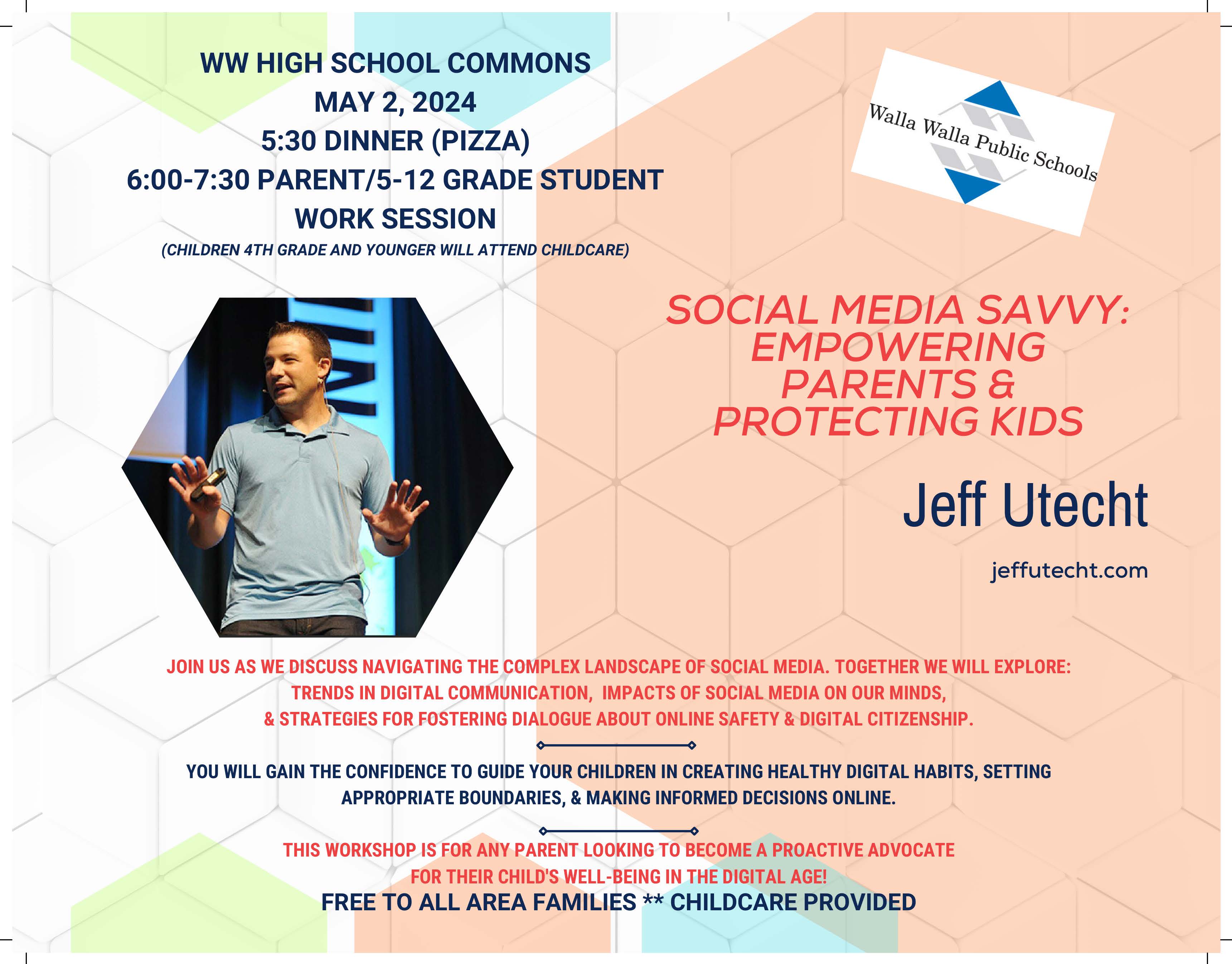Family and Community Engagement and Support (F.A.C.E.S.)

Pam Clayton
Family & Community
Engagement Coordinator
Phone: 509.526.6781
Text: 302.402.3916
Email: familiesandschools@wwps.org
Vision, Mission and Goals
Family and Community Engagement (F.A.C.E)
Vision: Walla Walla Public Schools is committed to engaging and partnering with families to build relationships that support and improve the learning, development, and health of children at home, in school, and in the community.
Mission and Goals: (English) (Spanish)
Current Opportunities
Social Media Savvy with Jeff Utecht
A Hands-On Presentation for
5th-12th Graders and Parents
|
This presentation has been updated with new content and focus compared to what Jeff provided to our families in January. If you attended the January session, we encourage you to join us again for this updated version.
Join us for an engaging workshop where we'll equip parents with the knowledge and tools they need to navigate the ever-evolving world of social media alongside their children. 🌐 Parents and their 5th-12th graders are encouraged to attend this fully interactive session together!
🗓️ Date: Thursday, May 2nd at 6:00 PM
During this session, parents and students will: 🔍 Explore the latest trends in digital communication
Through interactive discussions and practical guidance, participants will gain the confidence to: ✅ Guide their children in creating healthy digital habits
👨👩👧👦 This workshop is an invaluable resource for any parent looking to become a proactive advocate for their child's well-being in the digital age. Bring your phones and your social media accounts for an immersive experience! 📱
🧒 Please note: While parents and middle/high schoolers will be together for the full 90 minutes, accommodations will be made to care for elementary students if they choose to attend. Don't miss this opportunity to connect, learn, and empower your family in the digital age! RSVP below and mark your calendars. See you there! 🌟 |
Understanding Title 1 and Family Engagement in the Schools
Title I, Part A defines Family Engagement as the...participation of parents in regular, two-way and meaningful communications with school staff that involves the student, addresses learning and engages the family in school activities.
-
What is Title 1 and how does it benefit my child? (Infographic) English | Español
-
Want more information about Title 1?
WW Public Schools | Washington Office of Superintendent of Public Instruction
English | Español | Chinese | Korean | Punjabi | Russian | Somali | Tagalog | Vietnamese
-
Which schools provide Title 1 School-Wide Programs?
Berney, Edison, Garrison, Green Park, Lincoln, Pioneer, Sharpstein
General Family Engagement Information
"Parents are children's first and most influential teachers. By reading to children or having them read to us, by making sure homework is done, by monitoring television use, by knowing how children spend their time, parents can have a powerfully positive effect on their children's learning."
~ U.S. Secretary of Education
Over thirty years of research has proven that parent engagement is one of the largest determining factors related to school success. When parents are involved and engaged in their children's education the results are positive: children achieve higher grades, they attend school regularly, they demonstrate more positive attitudes and behavior, they graduate at higher rates, and they have a greater enrollment in higher education.
Walla Walla Public Schools is committed to establishing effective family engagement by:
-
Recognizing that all parents, regardless of income, education level, or cultural background, want to be involved in their children’s education and want their children to do well in school.Linking family and community engagement efforts to student learning.
-
Creating initiatives that will support families to guide their children’s learning from preschool through high school.
-
Developing the capacity of school staff to work with families.
-
Focusing efforts to engage families on developing trusting and respectful relationships.
-
Embracing a philosophy of partnership and be willing to share power with families.
-
Making sure that parents and school staff understand that the responsibility for children’s educational development is a collaborative enterprise.
Why is Family Engagement Important?
When parents and schools work together to support learning, students: earn higher grades, enroll in higher level programs, adapt better to school and attend more regularly, have better social skills and behavior, and graduate and go on to higher education.
You are your child's first and most influential teacher.
Ways to Engage in your Child's Education and Partner with the School
Where Children Spend Their Time:
-
School children spend approximately 12% of their time in school, 55% of their time out of school, and 33% of their time sleeping.
-
Since children spend a significantly more amount of time at home than at school, we need to help parents understand how to help their children continue to learn when they aren’t in school.
-
The primary emphasis is to give families the opportunity to be involved in their child’s educational growth outside of the regular school-day classroom and to see some of the enriching things their child is learning.
When Should Parents Get Involved?
-
The earlier in a child's educational process parent engagement begins, the more powerful the effects.
-
The most effective forms of family engagement are those which involve families in working directly with their children on learning activities at home.
Ways to engage in your child's education and partner with the school:
With guidance and support, families can become increasingly involved in home learning activities and find themselves with opportunities to teach, to be models for and to guide their children.
-
Set an example. Make it clear that you enjoy learning new things and reaching your goals.
-
Establish a regular time for homework.
-
Meet your child's teacher and contact the school/teacher whenever you have a questions or concern.
We are here to help!
-
Get excited about learning and achieving.
-
Be positive about education. Insist on good attendance, punctuality and effort.
-
Students should miss no more than 9 days of school each year.
-
Talk about the importance of showing up to school everyday, make that the expectation.
-
Help your child maintain daily routines, such as finishing homework and getting a good night's sleep.
-
Try not to schedule dental and medical appointments during the school day.
-
Don't let your child stay home unless truly sick.
-
-
Videos: Bringing Attendance Home (English); Trayendo la asistencia a casa (español)
-
Read, play, and talk to your child.
-
Help your children practice reading, writing, math and science skills at home. Let them teach you.
-
Ask them about school each day, and listen with undivided attention.
-
Promote healthy habits. Children who have enough exercise and sleep and who follow a balanced diet get sick less often and are better prepared to learn.
-
Motivate independent thinking, even if it leads to mistakes. Help your children see mistakes as opportunities to grow.
-
Families who read to their children, have books available, take trips, guide TV watching, and provide stimulating experiences contribute to student achievement.
-
Enroll your children in after-school activities that offer a variety of learning opportunities.
-
Get involved at school. Attend all the school events that you can. Fill out questionnaires, surveys, and requests to participate. Join the PTA. Volunteer with any of our schools through our Volunteer In Person (VIP) program. There are ways to help even if you can't get to the building or classroom....ask your child's teacher how you can make a difference.

